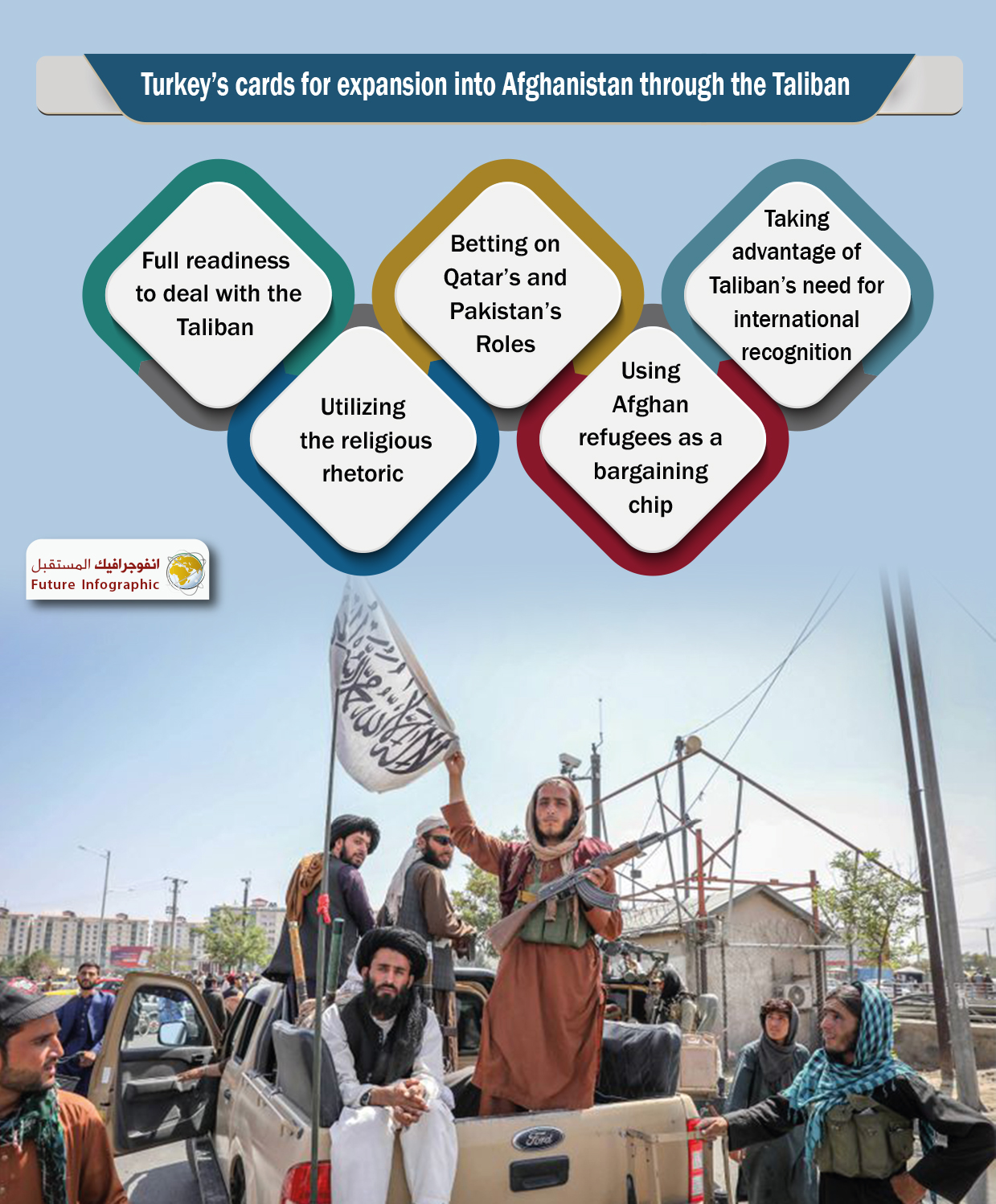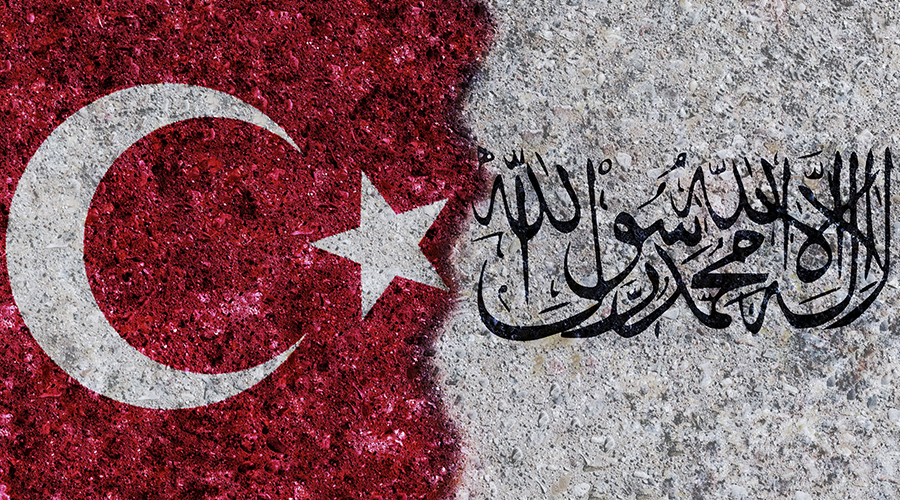It became evident that Turkey is looking for a foothold in Afghanistan, after the Taliban managed to take over the capital Kabul in mid-August. In its quest for a regional role in the country, Turkey is mobilizing all its regional cards and homemade tools, taking advantage of the Taliban’s need for opening up to the international community to receive recognition when it fits into any new Afghan government yet to be formed.
Although Turkey’s defense ministry announced, on August 25, that it began pulling out its troops from Afghanistan, it left the door open for taking up a security role in Kabul in a certain stage, and stated that “Turkey will continue to stand with the Afghan people as long as they want.” [1]Two days later, on August 27, Turkish President Recep Tayyin Erdoğan, revealed that the Taliban asked Turkey to run the International Hamid Karzai Airport in Kabul.
As Turkey is seeking a future regional role in Afghanistan, the eyes are set on the opportunities available for Ankara, whatever cards it holds for expanding its relationship with the Taliban, as well as the hardships, challenges and hurdles that block its quest.
Ankara’s Cards
Based on the realities of the policy pursued by Turkey after the Taliban’s takeover of Kabul and most of Afghanistan, the following factors stand out:
1- Full readiness to deal with the Taliban:
Since the Taliban seized control of Kabul, Turkey has been trying to send across positive messages to the group. President Erdogan, on August 18, described the group’s tone as moderate and said that Turkey is open to cooperation with the Taliban. Before that, Erdogan said he was prepared to meet with the Taliban leadership. Turkey’s positive rhetoric on the Afghan group shows the country’s preparedness to recognize the rule of the Taliban.
2- Utilizing the religious rhetoric:
The Turkish newspapers and statements made by a number of Turkish officials reveal an evident focus on the common cultural, religious and urban factors that Turkey and Afghanistan share. The aim is to send messages to woo the Taliban and assert that Ankara can play a role in introducing the group to the international community. This conclusion can be drawn from statements made by Taliban spokesperson Suhail Shaheen, in an interview with Turkey’s A Haber channel, on August 16. Shaeen said that the Taliban, which seeks to adapt to the world regime, expects good relations with Turkey which he described as a great Islamic country.
3- Betting on Qatar’s and Pakistan’s Roles:
Turkey is well aware that both Qatar and Pakistan maintain good relations with the Taliban. Qatar mediated peace negotiations between the United States and the Taliban held in Doha over the past period, while Pakistan, which has always been the Taliban’s backyard, provided the group with military, logistic and organizational support since it was defeated by the US forces two decades ago. Hence, Ankara bets on its good relations with both Doha and Islamabad to open doors to the Taliban in the coming period, and create what can be roughly described as an “Islamic space” that is compatible with Turkey’s regional policy.
4- Using Afghan refugees as a bargaining chip:
Turkey reportedly hosts more than 300,000 Afghan refugees. Due to the recent developments on the ground in Afghanistan, new waves of Afghan refugees displaced people poured into Turkey via Iran. Although the Afghan refugee issue sparked anger in Turkey against Erdogan, especially after leaks of an understanding reached between Erdogan and US President Joe Biden during their meeting in Brussel, some believe that Erdogan wants to take advantage of the issue. To be able to achieve that, he would either initiate contacts with the Taliban to discuss the fate of the Afghan refugees in the coming period, or “extort” European countries to get more funds, in the same way he dealt with the issue of refugees who fled to Turkey.
5- Taking advantage of Taliban’s need for international recognition:
It goes without saying that the Taliban is in need of international acknowledgement after its seizure of power. The need is even more urgent due to a lack of international confidence in the group, caused in particular by its hardline ideology and violent measures over the past period. Turkey might use the Taliban’s difficult reality as a door to open up to the group, using in particular its experience in backing hardline organizations, especially the armed factions in Syria, and the Libyan armed groups based in Tripoli where they run their operations. The endeavor comes as part of Turkey’s policy of backing Islamist groups, especially the terrorist Muslim Brotherhood organization operating across Arab countries.

Three Obstacles
Based on the above, Turkey may have a valuable opportunity for establishing a good relationship with the Taliban and an influential role in Afghanistan, which is a country of major weight not just on a regional level but also on international level. The road to achieving this goal is, however, not paved with roses and is rather riddled with hurdles and challenges to Turkey’s ambitions in Afghanistan, evidently as such:
1- Taliban’s rejection of foreign military presence in Afghanistan:
The Taliban recently reiterated rejection of any foreign presence on Afghan soil in the coming period. When Turkey sent a proposal to the US Administration to guard the Hamid Karzai International Airport in Kabul, the Taliban’s answer was categorical rejection, especially because Turkey is a member of the North Atlantic Treaty Organization, or NATO. To contest this rejection, Turkey announced, on August that it was pulling out its troops from Afghanistan. The Turkish Ministry of Defense said in a statement: “The Turkish Armed Forces are returning to our homeland’s soil with the pride of having accomplished the task they were entrusted with.”[2]
Although President Erdogan, on August 27, announced that the Taliban asked Turkey to operate the airport, the offer would in fact be limited to requesting technical support from Ankara to operate the airport, where the Taliban group will assume responsibility for the security of the airport. But Ankara may not accept this offer. On August 25, Reuters quoted Turkish officials as saying that Turkey will not help run Kabul airport after NATO's withdrawal unless the Taliban agree to a Turkish security presence, especially after the August 26 twin blasts that killed more than 170 people, including 13 US soldiers, outside the Kabul airport gates, the worst attack on western troops in Afghanistan since 2011.
2- Risks of moving outside the umbrella of NATO:
Turkish troops entered Afghanistan as a member of NATO and secured its troops there over the past period. Currently, if Ankara refuses to pull out its troops and decides to maintain military presence there independently of the alliance, the move would pose severe risks, not only because of weak capabilities but also because of a potential stand-off with the Taliban or other hardline organizations operating in Afghanistan whose actions are unpredictable in the coming period. Moreover, the Turkish opposition rejects Ankara’s plans to keep its troops in Afghanistan or deploy new troops as a result of any possible understandings. The opposition’s question to Erdogan would be: how can Turkey achieve security and stability in Afghanistan after the United States and the NATO failed to do so despite two-decades of military presence in the country for two decades?
3- Regional sensitivities of Afghanistan’s neighbors:
No doubt, any understanding about a future role for Turkey in Afghanistan would revive regional sensitivities to dominate the political landscape, especially in Iran, for sectarian, geopolitical reasons and also because of competition for influence in Afghanistan’s neighbors. That is also the case for Moscow, where Turkey’s moves from Afghanistan to Ukraine, all the way through conflict zones between Azerbaijan and Armenia, raise doubts and heighten sensitivities in Russia. China too would not feel comfortable about such a Turkish role, especially because it plays into the hands of extremist Islamist movements, and would, even though indirectly, give a boost to China’s Uyghur minority. This could also lead to an escalation of the conflict between India and Pakistan where Islamist groups reject India’s control of Kashmir. Based on that, any Turkish moves on the ground in Afghanistan would be faced by counter moves by regional states involved in the situation in Afghanistan, thus heightening inherent sensitivities between these states on the Afghan arena that can explode into intertwining internal and regional conflicts.

New Arena
Regardless of potential opportunities for a Turkish regional role in Afghanistan, the hurdles and challenges to such a role and Ankara’s announcement of pulling out its troops, Turkey now views Afghanistan as a new foreign arena for its policies, a launchpad for strengthening its regional cards and compensating regional losses. This is especially after the Ennahda Movement was ousted in Tunisia and failure of efforts to achieve reconciliation with Egypt and open a new chapter in relations between the two countries.
This perhaps is what prompted President Erdogan to reiterate on August 25, when withdrawal of Turkish troops from Kabul was announced, that Ankara continues to have an interest in playing a role in Afghanistan and keeping open contacts with the Taliban leaders. Two days later, on August 27 he stressed that his country was yet to make a decision on a request from the Taliban for Turkey’s help in operating the International Hamid Karzai Airport. In the same context, Presidential spokesman Ibrahim Kalin said on Twitter on August 25 that “Turkey will continue to work for the peace, security and prosperity of our Afghan brothers and sisters.”[3]
Consequently, making inroads to the Afghan arena may become a necessity at home for Erdogan who often resort to foreign issues to bolster popularity that is eroding due to the escalating crises.
To conclude, if it is logical to say that, in politics, not all assumptions should be ruled out, it is then mandatory to have a close look into Turkey’s quest for influence in Afghanistan. More specifically, Turkey’s geopolitical and cultural position as well as its NATO membership make it a potential candidate for playing regional roles in other countries. What might help Turkey to continue this quest is the Taliban’s urgent need for any move from the international community towards opening up to it in the coming period.
[1] https://www.aa.com.tr/en/asia-pacific/turkey-continues-its-longstanding-support-for-afghan-people/2346628
[2] https://english.alarabiya.net/News/world/2021/08/25/Turkey-s-military-began-evacuating-from-Afghanistan-on-Taliban-s-request
[3] https://www.aa.com.tr/en/asia-pacific/turkey-could-continue-to-operate-at-kabul-airport/2346268


